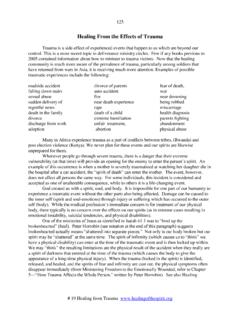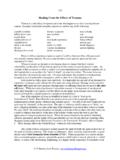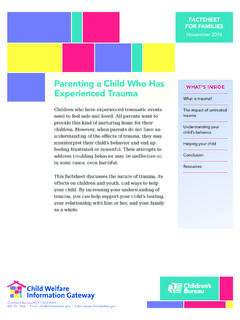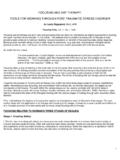Transcription of Trauma Debriefing - Hoedspruit
1 P O Box 1180 Hoedspruit , 1380 Tel: 015 795 5970 Fax: 086 515 5512 Email: Web: Trauma Debriefing The term Trauma has become a common word in the vocabulary of many South Africans. You have only to page through the daily newspaper to read about people s experiences of Trauma be it an armed robbery, a mugging, car hi-jacking, burglary, rape, assault, motor vehicle accident or natural disaster. Trauma is something we are frequently exposed to either directly or indirectly through the media. While it is indeed a common experience, there are perhaps as many definitions of the term Trauma as there are approaches to dealing with the consequences of it.
2 Trauma can be described as something extraordinary, unpredictable, unavoidable, not preventable and shocking. To help people overcome this sense of not being able to function after a traumatic event, Trauma Debriefing becomes a valuable tool. What is Trauma Debriefing ? Trauma Debriefing can be described as early interventions or non-clinical forms of secondary prevention for traumatised people. There are a variety of different approaches used, including information and advice ( psycho-education), self help groups, concrete and direct help ( housing, financial assistance), psychological Debriefing , crisis intervention, structured Trauma counselling and brief psychotherapy to name just some.
3 The Debriefing process is designed to enable the victim to re-experience the incident in a controlled and safe environment in order to make sense of and become reconciled to the traumatic incident. How do you know if you need a Trauma Debriefing ? If anyone has experienced any form of traumatisation, we should recommend that they have a Trauma Debriefing . It is always better to take preventative measures even if they feel they are coping all right. Explain to them that waiting until they discover themselves being overwhelmed by the after-effects of Trauma is even more difficult to deal with.
4 Some of the long term consequences of Trauma that is not dealt with would be on-going nightmares, anxiety attacks, hypervigilance, flashbacks etc. A Trauma Debriefing appears to curtail these after effects helping people to heal more quickly. A common response after a traumatic event is the feeling of loss of control over their own life. Through Debriefing , the development of adverse reactions to Trauma can be prevented by giving them back the perception and experience of control over their life. This control is achieved by enabling them to integrate, at a cognitive and emotional level, the profound personal experiences brought about by the Trauma .
5 Where there are a number of people involved in the same incident, the sharing of feelings and information in a group debrief is particularly useful as it enables the individuals to feel less isolated and encourages the acceptance of reactions to the Trauma as natural. The debrief is a way of allowing them to gain mastery of the disaster by actively redefining the experience and its consequences. The mastery experienced enables you to distance yourself from the event. Through this process the traumatic experience can be brought to a conclusion. Is Trauma Debriefing different from counselling?
6 Yes, there is a difference. Debriefing is not counselling or therapy nor is it a substitute for counselling or therapy. Whilst using some of the basic communication skills used in counselling, it is very different both in content and style from counselling. Firstly, the Debriefing is highly structured with the debriefer guiding you through a series of stages, looking at the traumatic event from different perspectives. Debriefing usually stands alone as a single psychological crisis intervention and is not part of ongoing therapy. Where deemed necessary or appropriate, follow-up sessions may be suggested by your Trauma debriefer.
7 Healing effects of Trauma Debriefing Some of the healing effects of Debriefing are: It re-establishes hope. The victim will realise that their feelings are normal and temporary, and that in time, they will become their old selves again (or close to). It establishes universality. It is a normal phenomenon that people are touched by Trauma It provides ventilation and catharsis. Group cohesion is healing, there is a common goal of finding a safe harbour. It provides information - which will improve the healing process







